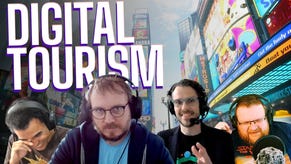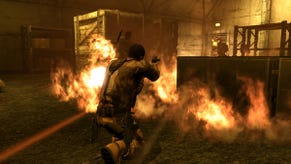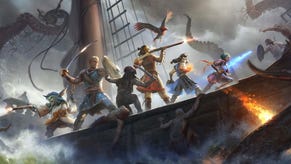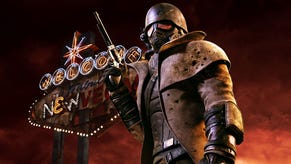Exclusive - Obsidian on Alpha Protocol, RPGs, staying indie and much, much more
Despite the fact Obsidian spy RPG Alpha Protocol's been pushed back into next year, the game remains one of the most anticipated in the market. Many of you were born to be Bond, clearly.
Good news for you all today, then. We've been lucky enough to get a huge chat with senior producer Ryan Rucinski, PR producer Matthew Rorie and lead designer Chris Avellone on the game, the state of play in RPGs in general and so much more your brain'll ache.
Hit the link. There really is a ton of stuff in there, so don't miss it.
Interview by Nathan Grayson.
VG247: What inspired Alpha Protocol? I mean, Bond and Bourne are obvious influences, but what else? What did you read, watch, and play while working on the game?
Ryan Rucinski: The inspiration came from a couple of the owners; Chris Jones and Feargus Urquhart. Over lunch they had a discussion as to why there were no spy/espionage RPG games in a modern day setting. At that time there were games that dealt with the genre but never as an RPG, and they were always set in the future so the "toys" they got to play with were pretty fantastic.
After the initial pitch everyone got into the idea and started our research. Movies and television that we took a lot away with were Syriana, 24, The Kingdom, Kill Bill, and quite a few novels and comics.
Chris Avellone: We did a lot of research covering the different espionage archetypes like Bond and Bourne. As Ryan said, we also immersed ourselves in several seasons of 24, as we wanted the missions and even the conversations to have an urgency about them to keep the pressure on. A lot of the Kill Bill influences came out of the concepting of the characters; each of them had enough of a visual and emotional signature without becoming so implausible as to be unrealistic. Having those signature-traits influence the plot and relationship mechanics was a lot of fun as well.
Alpha Protocol forgoes the nerdy mainstays of sci-fi and fantasy for spies and guns. Is Alpha Protocol meant to be a more mainstream-friendly RPG?
Ryan Rucinski: I wouldn't say it is more mainstream-friendly, but it is definitely something a bit different. We are catering to the players that don't mind action blended with a lot of the plot and character reactivity based on their actions. Depending on in-mission events (killing innocents, etc.) and what the player says and does, elements really do steer the story.
For example, I spent some of my money on intel to find out what kind of actions one of our characters had a predisposition to. I played up those elements to get on their good side, but as I went through the story I discovered that the character I was dealing with was a bit shady and not forthcoming with some of their true intentions.
I then put them in a position where they would, at their own risk, be helping me on a mission. When they got captured I had the option to forego my primary objective and rescue them or they could end up "perished." You might say that after the mission they (literally) didn't have the guts to betray me again.
I am not sure if that is mainstream, but it sure felt new and refreshing!
Chris Avellone: Ryan is a psychotic murderer masquerading as a producer and there were no witnesses to the events above: and that's one of the play-styles you can take in Alpha Protocol and have fun with it. We've made the game's mechanics accessible, but left a lot of the choices on how events unfold up to the player and their preferences.
I don't know if that's necessarily "mainstream," but it was a hell of a lot of work on our end to make sure the game catered to different action styles and different attitude styles (professional "paladins," pragmatic gung-ho soldiers, smooth talking operatives who just like getting in close to hear all the subjects have to say before silencing them with a takedown jab to the neck).
Will Alpha Protocol see any post-release DLC? And if so, will it be free or available for a small fee?
Matthew Rorie: I don't think we can really speak as to DLC at this point. Who knows what the future will bring, though?
Is Alpha Protocol a standalone story? Or are you taking a Mass Effect trilogy-like route and developing the game with sequels in mind?
Matthew Rorie: It's definitely a stand-alone story with a concrete beginning, middle, and end(ings). If the opportunity for a sequel arises, there are definitely places we could go with the story, but for the moment we're just hoping people enjoy Alpha Protocol in and of itself.
Chris Avellone: The game has an ending; several of them. The possibilities from there on out can be up to the player, but we wanted to focus on making the game complete in and of itself. We've taken pains to create a rich espionage world, however, so by the end of the game, it's apparent there's a lot more to explore in terms of factions, rival agencies, and counter-intelligence operations for additional content.
An alleged internal Sony tester recently said that Alpha Protocol wasn’t “RPG enough.” Ever since I read that, it’s been bugging me. RPG is such a muddled term these days. How does Obsidian define “RPG”? What makes a game an RPG, and not, say, a shooter with RPG elements or something like that?
Ryan Rucinski: "RPG" is a broad term with plenty of sub-elements. Technically, in any game you play as a character, you are playing the role of that character. A great game that was a shooter with RPG elements would be one of our favorites: System Shock 2.
In SS2 you ran through the game with pretty much no movies, a fixed story, and only one way to win. You did get bits of the story as you played through, and you got skills that helped you with some puzzle elements but besides the three archetypes of characters you really didn't get too in-depth. On a side note, even if I heard that freakin' monkey sound effect to this day I would probably swear and jump in the chair. Low on ammo and swinging a wrench at a monkey is no way to go through life.
Now, SS2 is very different than a Fallout or Oblivion title where everything is skill- and stat-based. Both are still technically RPGs one is just more about the numbers than the other.
Chris Avellone: An RPG is a game that provides character progression, opportunities for exploration, the ability to confront or fight adversaries and obstacles to achieve rewards, and, most importantly, gives choice in everything from character construction to action and dialogue choices in the game, and the game reacts to those choices in measurable ways. I agree with Ryan's System Shock 2 analogy. I think if that game had had one chance to choose sides or make a choice outside of the level progression, then it would have the spine of an RPG, no question.
The percentage that a player is engaged in each of the RPG elements also factors into the definition as well - Alpha Protocol is a pretty strong blend of action, character building, character interaction and reactivity (as well as providing options and optional content you never need to do). We have several major characters that you can kill, change the allegiance of, or never encounter at all, and all of these opportunities have major effects in the game. We think that's core to the RPG experience; we want people to discuss "their" path and see how much it compares to someone else's. (Our reactivity summaries in our debriefing screens showcase this pretty well.)
As a side note, we had a debug option that showcased all the reactivity for each level, and when a reviewer took a look at it, it was one of the aspects he enthusiastically brought up - he found that seeing all the reaction results for a level was pretty fascinating. He was able to see how all the mission choices and dialogue choices could have played out and the effects it would have on people's reactions, intel, and future mission structure.
We've been tempted to provide the debug command to expose all the reactivity for the official reviews, but we'll see. We may just want to let people discover them on their own.
In that vein, plenty of games integrate elements of RPGs these days. Rock Band has character customization. Shooters like Call of Duty have upgradeable weapons. Do you think the RPG will eventually fuse with other genres wholesale and sort of just fade out of existence?
Ryan Rucinski: Nope, never. RPGs have changed over the decades but they have never faded away; they just changed to better suit the players.
RPGs used to be isometric only and turn-based. Then they moved to 3D dungeon-crawling with turn-based combat. Then a mix of real time combat in an isometric view, etc. RPGs continually adapt to the audience.
Chris Avellone: I agree with Ryan, I think there'll always be a market for single-player RPGs. Even MMOs still recognize that a lot of players enjoy a single-player experience. I think there's a lot of cool elements other game genres can draw from RPGs (just as RPGs can draw from the same genres, like we did with Alpha Protocol), and I think a lot of it is because a good chunk of fun about an RPG is personalizing your character, upgrading them and seeing them grow, and seeing what reactivity you get out of poking the environment. Players enjoy those mechanics, regardless of the actions they're taking in the game, whether platformer, racing game, or sports game.
Good vs. evil morality systems are showing up in everything from Infamous to Army of Two these days. Alpha Protocol, however, jettisoned that in favor of the player’s actions shaping other characters’ opinions of the main character. Is this the beginning of the end for the black-and-white, light side vs. dark side meter?
Ryan Rucinski: I don't think so. Some stories are specifically aimed at the extremes. That is up to the writers and designers of the game.
I can honestly say that Light/Dark is a hell of a lot easier to thoroughly write and test for. We have so many gray area actions going on that it is entirely possible to play through Alpha Protocol many times and find something new happen because of a decision you made very early in the game.
It's awesome when you pull it off but I am certain that there were days that Chris Avellone wanted to actually get some sleep.
Chris Avellone: I doubt that black and white morality systems are going to end any time soon, and I'd say that for certain genres, having a strict black/white morality scale supports the genre and the game (Star Wars, for example). In Alpha Protocol, however, rather than you being marked as good or evil (which is a weak classification for the spy genre, in my opnion), individual people's perceptions of you change.
We do allow the player to offer motivations and commentary on their own actions in the game (which may not mesh at all with their motivations at the end-game, with great results), but NPCs react to the player based on the NPC's own morality judgments, not the player's - or ours as game designers.
Alpha Protocol was recently said to have “tasteful, yet satisfying” sex scenes. There’s also an Achievement for doing the deed with every potential romantic interest in the game. Sex in most games, then, tends to represent a simple, concrete reward for completing a long, romantically oriented quest line. When do you think games will move beyond this simple reward-centric use of sex? When and how do you think sex will be used to elicit deeper emotions in games?
Chris Avellone: I don't see sex in games as an achievement to be earned, but as an experience, and I think Alpha Protocol delivers it as an experience first. There's a lot of emotional depth in Alpha Protocol from bonding over mutual respect, friendship, questioning traditional loyalty (at points, quite extreme), and even what I would call "no-mances," which are devoid of romantic feeling entirely but provide a nice character arc for the player and the target, regardless. All of these aspects also change the flow of the game, the story, character's attitudes, and can cause changes in your companions, missions, objectives, and even expose more of the backstory of you and your love interest. I think the focus on sex solely as sex (or more specifically, the taboo it has) is pretty ridiculous.
Studios like Obsidian and Treyarch have a very interesting business model in that you are often at the head of sequels to already established franchises. (You took over Neverwinter Nights, KOTOR, and Fallout. Treyarch develops every other Call of Duty.) What are the pros and cons of this business model? What’s it like to sort of inherit big-name franchises? How do fans react to this kind of thing?
Ryan Rucinski: It definitely helps extend the life of some of the franchise titles. Just think that if Treyarch were too busy to be able to do the next CoD then the players out there might have to wait 2-3 years to play the next iteration. That is quite a long wait.
I know there is the potential that if I couldn't play a Fallout for that many years my interest might have waned and I could have moved on to the next big thing.
Depending on the developer and the franchise there are some real mixed results with the fans because of their past experiences. Some developers are a natural fit to help keep those titles and expansion moving and while there might be a bit of angst it is understood that if they want to experience more of their favorite game that this is who is going to do it for them.
If Obsidian were a developer that was known for making dating sims, I am pretty sure that the fans of the Fallout franchise would find out where we worked and drive a burning manure truck into the building.
Needless to say, there is some pressure to make sure you do it right.
Chris Avellone: Usually dealing with established franchises and leveraging the technology gives us a lot more time to focus on the content of a title (which can be castrated by actual development time) - it's something that you see happen when expansion packs for games comes out, and happened with Neverwinter Nights' Mask of the Betrayer and Storm of Zehir. When you don't have to worry about the stability of the technology (or at least knowing its limitations), when you've got the content pipelines figured out for how to make levels, characters, conversations, etc. you can focus solely on the player's experience and fleshing that out.
Obsidian is an independent developer that focuses on triple-A games, mostly in a single genre. Lately, independent developers have been purchased by publishers right and left, with id Software being the most recent example. What are the advantages to staying independent, and would Obsidian ever consider being bought by a major publisher?
Ryan Rucinski: Staying independent does give us the liberty to work on more than just a single franchise or two. Publishers have lots of great licenses in their hands and are looking for the right developer for their product. If we were owned by a publisher, we would very likely be stuck on licenses they own.
However, being owned by a publisher also supplies a lot of security because we wouldn't have to actively seek a publisher to see if they have any work that needs to be done.
I'm sure that if the price and the publisher were a good match something could be worked out but I don't deal with that part of the business.
Obsidian’s always mentioned alongside BioWare, which makes sense, because you both specialize in a similar style of RPG and you’ve taken up the reins on a couple of their licenses. Which is great, I’m sure. After all, BioWare rocks. In the deepest recesses of your heart, though, does that ever irk you? Do you ever wish that people would say, “Oh, that’s a BioWare/Obsidian style RPG,” instead of just giving BioWare credit for everything?
Ryan Rucinski: Personally, I think it is a compliment if a person thought that an Obsidian game was made by BioWare. They are awesome at what they do, and we all know it.
Chris Avellone: I agree with Ryan. Doesn't bother me: we owe a lot to BioWare, and we see a lot of influences based on leveraging their technology. Using their tech does bleed into the design of games in general and that happened when we were at Black Isle all the way to Neverwinter Nights 2 and the expansions at Obsidian. There'll be less of that in the future as we develop Onyx (Obsidian's proprietary engine) and gameplay systems in the Onyx engine, though.
Obsidian has a rich history of story-based games. What do you think of games like Heavy Rain, which eschew traditional gameplay systems (shooting, platforming, role-playing, etc) altogether in favor of pure narrative-driven experiences?
Chris Avellone: I can't wait to play Heavy Rain, and the dialogue system and presentation alone make me want to snag it and play it when it comes out.
Last but not least, Obsidian has one “unannounced game” on its plate. Can you give us any hints at what it might be? Is it an original IP? Or is it something brand new? Is it even an RPG?
Ryan Rucinski: To answer one of those questions I can firmly say "Maybe."
Sorry, you know how it is. Until we get the go ahead from the Publisher we are legally bound to not say anything.










